October 20th, 2010 by jpopo | No Comments »
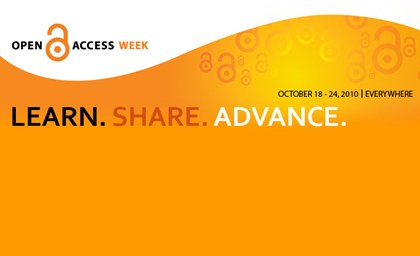
OA Sessions* for Today – Wednesday, October 20th:
Workshop on Managing Your Copyright & Author Rights @ 1:30-3:00pm
Open Access and the Opportunity for Universities @ 3:00-4:00pm
Scholarly Rights and Responsibilities in the Digital Age @ 4:00-5:30pm

Click here to see OA Week schedule at UBC Vancouver & UBC Okanagan.
Enjoying the OA sessions at UBC so far? If so, email us at ubc-oaweek@interchange.ubc.ca.
* Unless otherwise noted, all OA sessions held at UBC Vancouver are located in the Lillooet Room – 3rd floor – Irving K. Barber Learning Centre.
Posted in Uncategorized | No Comments »
October 19th, 2010 by jpopo | No Comments »

OA Sessions* for Today – Tuesday, October 19th:
An Open Platform: Using the UBC Wiki as a Collaborative Tool and Information Repository @ 10:00-11:00am
Exploring Open Source Options for Records Management @ 11:00am-12:00pm
Choosing to be an Open Access Journal @ 2:00-3:30pm

Click here to see OA Week schedule at UBC Vancouver & UBC Okanagan.
* Unless otherwise noted, all OA sessions held at UBC Vancouver are located in the Lillooet Room – 3rd floor – Irving K. Barber Learning Centre.
Posted in Uncategorized | No Comments »
October 18th, 2010 by jpopo | No Comments »

OA Sessions* for Today – Monday, October 18th:
Funding Agency Panel: Opening up Access** @ 9:00-10:30am
Opening Remarks @ 1:30-1:45pm
Intro. to Open Access and Connected Open Movements @ 1:45-2:00pm
Developing the Cycling Route Planner @ 2:00-2:30pm
Open Research Data @ 2:30-3:30pm

Click here to see OA Week schedule at UBC Vancouver & UBC Okanagan.
* Unless otherwise noted, all OA sessions held at UBC Vancouver are located in the Lillooet Room – 3rd floor – Irving K. Barber Learning Centre.
** Connect from your own computer or come to the free live webcast in Woodward Library, McKechnie Room.
Posted in Uncategorized | No Comments »
October 14th, 2010 by jpopo | No Comments »
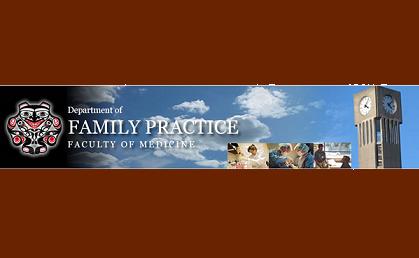
The Health Advocate Role: Preparing Future Physicians for Socially Responsive Practice is now available in cIRcle, UBC’s digital repository!
Health advocacy represents an opportunity for physicians and physicians-in-training to respond appropriately to the social determinants of health, health care inequities, and the needs of underserved populations. To better prepare physicians-in-training, there is a need to identify tangible ways of incorporating health advocacy into medical curriculum.
The purpose of this e-booklet is to:
- Highlight the activities of health advocate ‘champions’, Vanessa Brcic, Jocelyn Chase, Healthy Young Minds, Tracy Monk, Davedeep Sohi, and Brian Westerberg
- Discuss the social determinants of health and provide case examples on health advocacy
- Identify relevant literature on health advocacy, teaching approaches, and existing program
To access, download, and/or create a permanent link to this e-booklet on your blog or website, visit cIRcle at: http://hdl.handle.net/2429/28934.
For any additional information about this e-booklet and other similar teaching resources from the Faculty of Medicine, visit the Office for Faculty Development.
Above logo is courtesy of the Department of Family Practice – Faculty of Medicine – at UBC.
Posted in Uncategorized | No Comments »
October 5th, 2010 by jpopo | No Comments »

[Photo of: Black bears utilizing reclaimed mine area.]
A new offering from UBC Library at the University of British Columbia enables users to access decades of valuable information on mine reclamation for free.
Each year, the British Columbia Mine Reclamation Symposium is presented by the B.C. Technical and Research Committee on Reclamation (TRCR). This first symposium was held in 1977 as a response to a need in the province for enhanced government and industry communications in the area of environmental protection and reclamation associated with mining.
Proceedings of these symposia, covering not only B.C., but also Canadian and worldwide mines, are a valuable source of information on this important topic. Now, thanks to a successful collaboration between UBC Library and the TRCR, all conference papers – more than 600, dating from 1977 to the present – are available for free online.
The papers are hosted by cIRcle, UBC’s digital repository, which serves as an archive of UBC’s intellectual output. They can be found and searched at https://circle.ubc.ca/handle/2429/6934.
The proceedings have proven to be a big draw. For example, the most popular paper – “Water management of the Steep Rock Iron Mines at Atikokan, Ontario during construction, operations, and after mine abandonment,” found at https://circle.ubc.ca/handle/2429/10657 – has been viewed and downloaded hundreds of times, mainly by users in the U.S. and Canada, but also by those from the U.K., Portugal, China, India , Finland and Norway.
This feature is a valuable resource for anyone in the mining and related industries who is involved with reclamation. Moreover, all recent UBC dissertations, including those related to mining, are available in cIRcle for free and can be found at https://circle.ubc.ca/handle/123456789/2.
The Northern Miner newspaper recently published a story on the mining reclamation symposia, cIRcle and UBC Library.
For more information, please contact Eugene Barsky, Science and Engineering Librarian, at eugene.barsky@ubc.ca.
Above Image Courtesy of: B.C. Technical and Research Committee on Reclamation Photo Gallery
Above excerpt in italics is courtesy of UBC Library News from UBC Library News blog – https://blogs.ubc.ca/librarynews/2010/10/04/mining-for-information/
Posted in Uncategorized | No Comments »
August 13th, 2010 by jpopo | No Comments »

If so, are you also asking yourself, “How does it affect me – as an author, creator, or copyright owner?” or perhaps, “How does it affect me – as an educator, researcher, or user?”.
Bill C-32 is an amendment to the current Copyright Act in Canada and recognized as the Copyright Modernization Act. As announced by the Government of Canada in early June 2010, here is the backgrounder [in part] from the Balanced Copyright website of the Government of Canada:
“[T]he Government of Canada reiterated its commitment to strengthening laws governing intellectual property and copyright in order “to encourage new ideas and protect the rights of Canadians whose research, development and artistic creativity contribute to Canada’s prosperity”. The bill follows through on this commitment.”
“In the summer of 2009, the government launched an eight-week national consultation on copyright modernization. Thousands of Canadians, businesses and stakeholder organizations shared their ideas on how to best adapt Canada’s copyright framework to the digital age. What the government heard is that Canada needs new laws that are fair and balanced for today’s content creators and users and adaptable to respond to the challenges and opportunities of tomorrow.”
Would you like to know more about Bill C-32?
See news releases and resource links about Bill C-32 listed at the end of this blog post.
Above Image Courtesy of: Balanced Copyright – Government of Canada
Above excerpt in italics is courtesy of Balanced Copyright – Government of Canada website.
News Releases:
Resource Links:
Posted in Uncategorized | No Comments »
August 5th, 2010 by jpopo | No Comments »
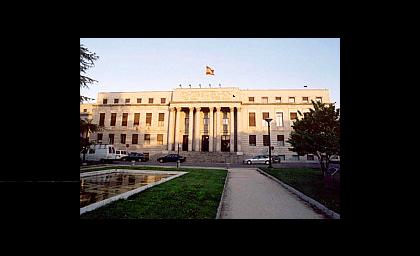
Did you know? In the ranking of world digital repositories, UBC features at #43.
The “Ranking Web of World repositories” is an initiative of the Cybermetrics Lab, a research group belonging to the Consejo Superior de Investigaciones Científicas (CSIC), the largest public research body in Spain.
The Cybermetrics Lab, part of the CCHS – CSIC, is devoted to the quantitative analysis of the Internet and Web contents specially those related to the processes of generation and scholarly communication of scientific knowledge. The Cybermetrics Lab using quantitative methods has designed and applied indicators that allow us to measure the scientific activity on the Web.
Above Image Courtesy of: Ranking Web of World Repositories – Spanish Research Council
Above excerpt in italics is courtesy of Ranking Web of World Repositories website – Ranking Web of World Repositories: Top 800 Institutional Repositories
Posted in Uncategorized | No Comments »
July 30th, 2010 by jpopo | No Comments »
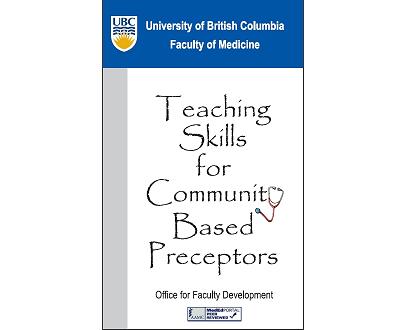
Teaching Skills for Community Based Preceptors is now available in cIRcle, UBC’s digital repository!
This is a short booklet developed by the physicians in the Office for Faculty Development. It was designed to help faculty to teach more effectively in the clinical setting.
The content reviews principles and practical tips for preparing to teach, teaching around patient cases, giving effective feedback and evaluating students. It reviews many practical teaching skills such as: orientation of the learner, task specific teaching, the one minute preceptor, the OPEN model for providing feedback. The booklet can be read in approximately 20 minutes or one can flip through the quick tips for a brief overview of the principles.
A sampling of the questions answered and topics discussed include the following:
What is an effective clinical teacher?
The Learning Cycle
Preparing to Teach
Teaching with Patients
Observations, feedback & assessment
A handy “Clinical Teaching Survival Guide” and a “Competency Teaching Checklist for Clinicians” are also included in this booklet.
To access, download, and/or create a permanent link to this booklet on your blog or website, visit cIRcle at: http://hdl.handle.net/2429/26718. Note: It is approved for Creative Commons Attribution-Share Alike 3.0 License (click to view license details).
For any additional information about this booklet and other similar teaching resources from the Faculty of Medicine, visit the Office for Faculty Development.
Above excerpt in italics is courtesy of Office for Faculty Development.
Posted in Uncategorized | No Comments »
July 29th, 2010 by jpopo | No Comments »
Mark your calendars!
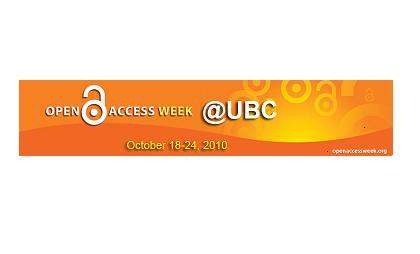
– October 18-24, 2010 –
UBC is once again participating in the International Open Access Week event, where the research and academic community worldwide come together to share and learn about open access and other connected global open scholarship movements.
UBC’s own event – Open Access Week @ UBC – showcases a week of diverse events highlighting areas of open scholarship that UBC’s researchers, faculty, students and staff participate in. These events include discussion forums, lectures, seminars, workshops, and symposia on topical and timely issues from every discipline. We invite everyone to participate either by organizing events, highlighting events already coinciding with the Week, or attending the events to be scheduled.
All of these events are FREE and open to the public, students, faculty, staff and schools.
Missed last year’s Open Access Week event at UBC? Check out some of those presentations in cIRcle at: https://circle.ubc.ca/handle/2429/2689.
Above excerpt in italics is courtesy of Open Access Week @ UBC webpage – http://oaweek.scholcomm.ubc.ca/open-access-week-2010/
Posted in Uncategorized | No Comments »
May 31st, 2010 by jpopo | 2 Comments »
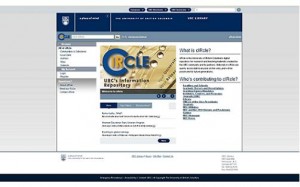 Like the new look? Tell us!
Like the new look? Tell us!
Launch of New cIRcle Web Site
Today, we are pleased to announce the launch of our new web design for cIRcle, UBC’s Information Repository at http://circle.ubc.ca/ here at the University of British Columbia. New features and functions include:
Features:
- “Image Carousel” – striking images linked to news items
- “Did you know?” – quick facts about cIRcle
- “News” – latest cIRcle & UBC news highlights
- “Top 3 Items” – the three most frequently viewed cIRcle items
Functions (available since December 2009):
- “Statistical information” – see and/or track item page views & file downloads
- “Audiovisual streaming” – improved multimedia access
- “File conversion” – convert from one file format to another
- “Embargo feature” – access control management
- “Campus Wide Login (CWL)” – via Shibboleth authentication
- “Reporting Suite” – generate database usage reports
Who Re-designed the Site?
UBC Library staff worked closely with the Atmire company (atmire.com) to re-design the cIRcle website. We would like to thank our Atmire consultants, UBC Library Systems & Information Technology and the many UBC Library colleagues, supporters, and cIRcle end-users for their contributions.
Wanted: Your Feedback
Have a look around cIRcle and be sure to contact us at ubc-circle@interchange.ubc.ca if you have any questions or comments. We would love to hear from you!
Posted in Uncategorized | 2 Comments »








